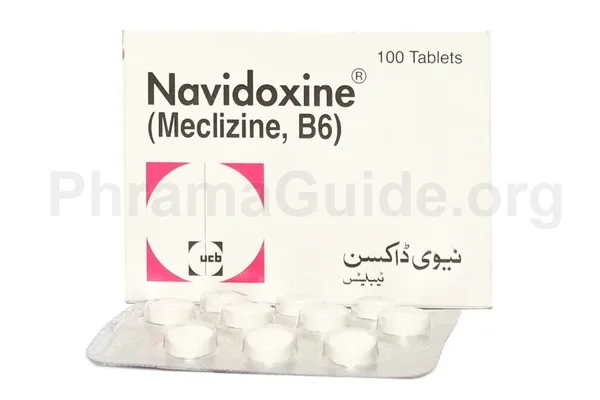Navidoxine is a combination medication that is used to treat nausea, vomiting, and dizziness caused by motion sickness or vertigo. It’s often combined with vitamin B6 (pyridoxine) to enhance its efficacy. While this combination can be effective, it’s important to be aware of potential side effects. Some common and less common side effects of Navidoxine may include.
Common Side Effects
- Drowsiness: Navidoxine can cause drowsiness or sedation, especially when taken in higher doses or with other medications that have a similar effect. This might impair your ability to drive or operate machinery.
- Dry mouth: Some individuals might experience a dry sensation in the mouth while taking Navidoxine.
- Blurred vision: Navidoxine can affect vision, causing temporary blurriness or difficulty focusing.
- Nausea or upset stomach: Ironically, while Navidoxine is often used to alleviate nausea, it can sometimes cause mild stomach discomfort.
- Allergic reactions: Allergic reactions to Navidoxine can include rash, itching, swelling, severe dizziness, or trouble breathing. Seek immediate medical attention if you experience any of these symptoms.
Less Common Side Effects
- Irregular heartbeat: In rare cases, Navidoxine can affect heart rhythm, leading to palpitations or irregular heartbeat. This is more likely in individuals with pre-existing heart conditions.
- Difficulty urinating: Navidoxine can cause urinary retention or difficulty passing urine, especially in individuals with prostate issues.
- Confusion or cognitive impairment: Some people may experience confusion, disorientation, or difficulty concentrating while taking Navidoxine, especially at higher doses.
- Hypersensitivity reactions: While allergic reactions are rare, they can include severe symptoms like anaphylaxis, which is a life-threatening allergic reaction characterized by difficulty breathing, swelling of the face or throat, and a rapid drop in blood pressure.
- Liver problems: Though uncommon, Navidoxine can, in rare instances, affect liver function, leading to symptoms like yellowing of the skin or eyes (jaundice), abdominal pain, or unusual fatigue.
- Blood disorders: There have been rare reports of blood disorders such as decreased platelets (which can lead to easy bruising or bleeding) or decreased white blood cells (which can increase the risk of infections).
- Muscle stiffness or tremors: Some individuals might experience muscle stiffness or tremors as a less common side effect of Navidoxine.

What is Navidoxine?
Navidoxine is one of the leading brands with a combination of Meclizine and B6, manufactured and marketed by AGP (Pvt) Ltd, Pakistan.
Navidoxine : Available Formulations and Strengths
Presently, Navidoxine is available in Tablet Form with the following strengths.
Navidoxine Tablet : Meclizine 25mg + B6 (Pyridoxine) 50mg strengths.
What Are The Possible Drug Interactions of Navidoxine?
- Central Nervous System (CNS) Depressants: Navidoxine can enhance the sedative effects of other CNS depressants like alcohol, tranquilizers, sedatives, or other antihistamines. This combination can increase drowsiness and impair cognitive and motor function.
- Anticholinergic Medications: Combining Navidoxine with other medications that have anticholinergic effects (such as certain antidepressants, antipsychotics, or medications for overactive bladder) can lead to increased anticholinergic side effects like dry mouth, blurred vision, constipation, and urinary retention.
- Monoamine Oxidase Inhibitors (MAOIs): Concurrent use of Navidoxine with MAOIs can result in an increased risk of serious side effects like hypertensive crisis (dangerously high blood pressure).
- Medications affecting heart rhythm (QT prolongation): Combining Navidoxine with medications that also prolong the QT interval (such as certain antibiotics, antipsychotics, or antiarrhythmics) can increase the risk of abnormal heart rhythms.
- Medications metabolized by CYP2D6: Navidoxine can inhibit the activity of the CYP2D6 enzyme, which can affect the metabolism of certain medications metabolized by this pathway. This could potentially lead to increased levels of these medications in the bloodstream, causing elevated effects or toxicity.
- Levodopa: Navidoxine may decrease the effectiveness of levodopa (used in the treatment of Parkinson’s disease) due to its anticholinergic properties.

Leave A Comment